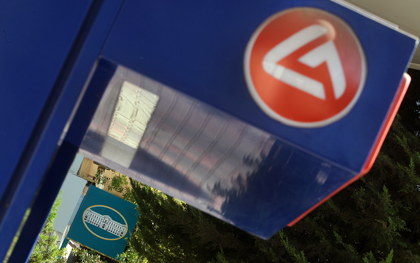Picture: www.naftemporiki.gr
The merger of the National Bank of Greece with Eurobank will bring 570-630 million euro per year by the end of 2015, the National Bank informed. This will come from the merger of domestic and regional networks of both banks, consolidation of infrastructure and central operations, reduction of general and administrative costs, both in Greece and abroad, optimisation of investment and financial strategy of the group, as well as an increase in the percentage of transactions with existing customers through an expanded product portfolio and economic strength of the merged group. Based on the interim economic performance of the two banks for the period which ended on 30 September 2012, the expanded group of the National Bank will have assets worth 174.2 billion euro, 113 billion euro loans and takings from customers, as well as 84.6 billion euro deposits. Moreover, the new group will also benefit from a strong network throughout Greece, as well as an increased presence on the markets in Southeast Europe, Turkey, Bulgaria, Romania and Serbia.
The newsletter of the bank mentions the main steps which will lead to the total effect. Regarding functional costs, the main source will include rationalisation of the network of branches and ATMs of the new group in Greece and neighbouring countries, where these overlap. It is noted that, in Greece, about 40% of Eurobank's customers are also customers of the National Bank, and about 80% of the network of branches of the two banks overlap. Branches of Eurobank will be utilised in cases where the National Bank is not present or poorly represented in the given region. Of approximately 915 branches of the new group in Greece, about 20% will be closed, and of the 2,000 ATMs, also about 20% will be removed.

The second important effect will be savings from the consolidation of central services (e.g., supplies, accounts receivable management, economic services, internal control, etc.), as well as information services (a switch to an optimised system between the two banks). There will be a reduction in the number of employees of the new group. In Greece, it will examine its market presence in order to streamline it, which will lead to a merger of the two banks' subsidiaries, which have similar operations, and a reduced number of staff. Similar processes will also occur on the markets in Southeast Europe. Of the 1,080 branches of the two banks in neighbouring countries, about 25% will be closed in Bulgaria, Romania, Serbia and Cyprus, where both banks are represented. A special working group of senior executives of the two banks will be established that will guide the successful integration of the two banks into one group.
As regards the management of the National Bank's new group, George Zanias and Alexandros Tourkoulias are expected to remain president and CEO of the new group, respectively. The composition of the executive committee, as well as the choice of the other top posts in the new structure, will be based on the principle "both banks' best ones."
The acceptance period of Eurobank's public offer, submitted by the National Bank, is from 11 January until 15 February. The results will be announced within two days after its completion, and new shareholders' negotiations will begin on 27 February. The public offer of the National Bank stipulates the exchange of 58 shares of the National Bank for every 100 shares of Eurobank. It is noted that Eurobank's shareholders, owning 43.6% of the right to vote, are bound to make their shares available. As of 11 January 2013, during the period of acceptance of the offer, the public newsletter and declarations of acceptance of the public offer will be distributed free of charge on weekdays in all branches of the National Bank of Greece.
In a statement, Eurobank Ergasias said that the Board of the bank, after having considered the conditions of the National Bank's public offer to its shareholders, discussed the proposal at a meeting. Taking into account the content of the National Bank's information bulletin, reports by advisers of Eurobank - Deutsche Bank AG, London Branch and Goldman Sachs International, as well as the opinion of the group's investment bank, Barclays Bank PLC, the Management Board of Eurobank decided that the proposed swap meets legislative requirements, as well as the Committee on Capital Markets' remark of 19 December 2008. Furthermore, the proposal is fair, from a financial point of view, and consistent with internationally recognised exchange methodologies.
According to the Board of Eurobank, the public offer allows shareholders to become shareholders of an enlarged group, with a significant presence in most countries of Southeast Europe. They will also benefit from the earnings that are expected to be derived from the merger. The statement also said that the creation of the new group will allow for the optimisation of the strengths of both organisations, especially the number of employees, so that the experience and abilities of all be evaluated. All efforts will be made so that these upcoming changes have the least possible social implications.